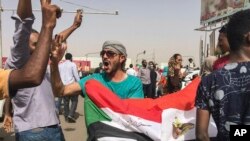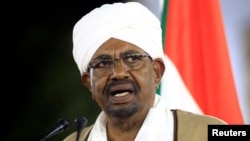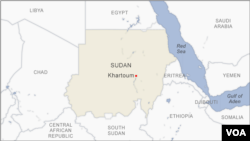Naba Mohiedeen contributed to this report from Khartoum.
WASHINGTON / KHARTOUM — The longtime president of Sudan, Omar al-Bashir, was ousted by the military Thursday after four months of mounting demonstrations against his rule.
Speaking on national television, Sudan's defense minister, Awad Mohamed Ahmed Ibn Auf, announced what he called "the toppling of the regime." He said al-Bashir had been arrested and was in a safe place.
The defense minister said a transitional military council will run the government for the next two years. He also declared a three-month state of emergency, the suspension of the constitution and the dissolution of parliament.
Earlier, a Sudanese military source told VOA that al-Bashir, 75, had been put under house arrest.
Tens of thousands of people poured into the streets of Khartoum on Thursday to celebrate the president's ouster, dancing and chanting anti-Bashir slogans. Later in the day, some protesters denounced the army statement and said they rejected the idea of a military-led ruling council.
Sudan's powerful National Security and Intelligence Service said it would release all political detainees throughout the country, according to a report on state media. Witnesses, however, said protesters attacked intelligence buildings in two eastern cities, Port Sudan and Kasala, because releases failed to materialize.
The U.S. State Department said Washington "strongly supports a peaceful and democratic Sudan." In a statement released Thursday, it called on "the transitional government to follow the will of the people, work in an inclusive way with all representative parties, and commit to a speedy handover to civilian rule."
The U.S. Embassy has advised Americans in Sudan to avoid areas of demonstrations.
U.N. spokesman Stephane Dujarric said Thursday that Secretary-General Antonio Guterres expected "the democratic aspiration of the Sudanese people will be realized through an appropriate and inclusive transition process.''
The protests began Dec. 19, with demonstrators accusing al-Bashir's government of economic mismanagement that has sparked skyrocketing food prices, and fuel and foreign currency shortages.
Al-Bashir, who came to power in an Islamist coup in 1989, imposed a nationwide state of emergency Feb. 22 in an attempt to suppress the protests after an initial crackdown failed. The government said weeks ago that 31 people had been killed, but the group Physicians for Human Rights estimates the death toll is at least 60.
Pressure on al-Bashir mounted this week as tens of thousands of protesters held a five-day sit-in outside army headquarters in Khartoum. On Tuesday, soldiers protected the crowd from riot police, a signal that the army did not support al-Bashir.
Al-Bashir is wanted by the International Criminal Court on charges of war crimes, crimes against humanity and genocide in connection with atrocities in the western region of Darfur.







